Travel and Tourism: Historical Developments, Impacts and Strategies
VerifiedAdded on 2020/01/28
|18
|3811
|203
Report
AI Summary
This report provides a comprehensive overview of the travel and tourism industry, examining its historical developments, structure, and the influence of various stakeholders. It delves into the functions of government bodies and international agencies, as well as the impact of local and national economic policies on the sector's success. The report further analyzes the implications of political changes in different countries, particularly focusing on the UK and China. It explores the factors affecting tourism demand and how supply meets this demand, using the TUI group as a case study. Additionally, it discusses the positive and negative impacts of tourism, along with strategies to minimize the negative effects, concluding with a summary of key findings and references.
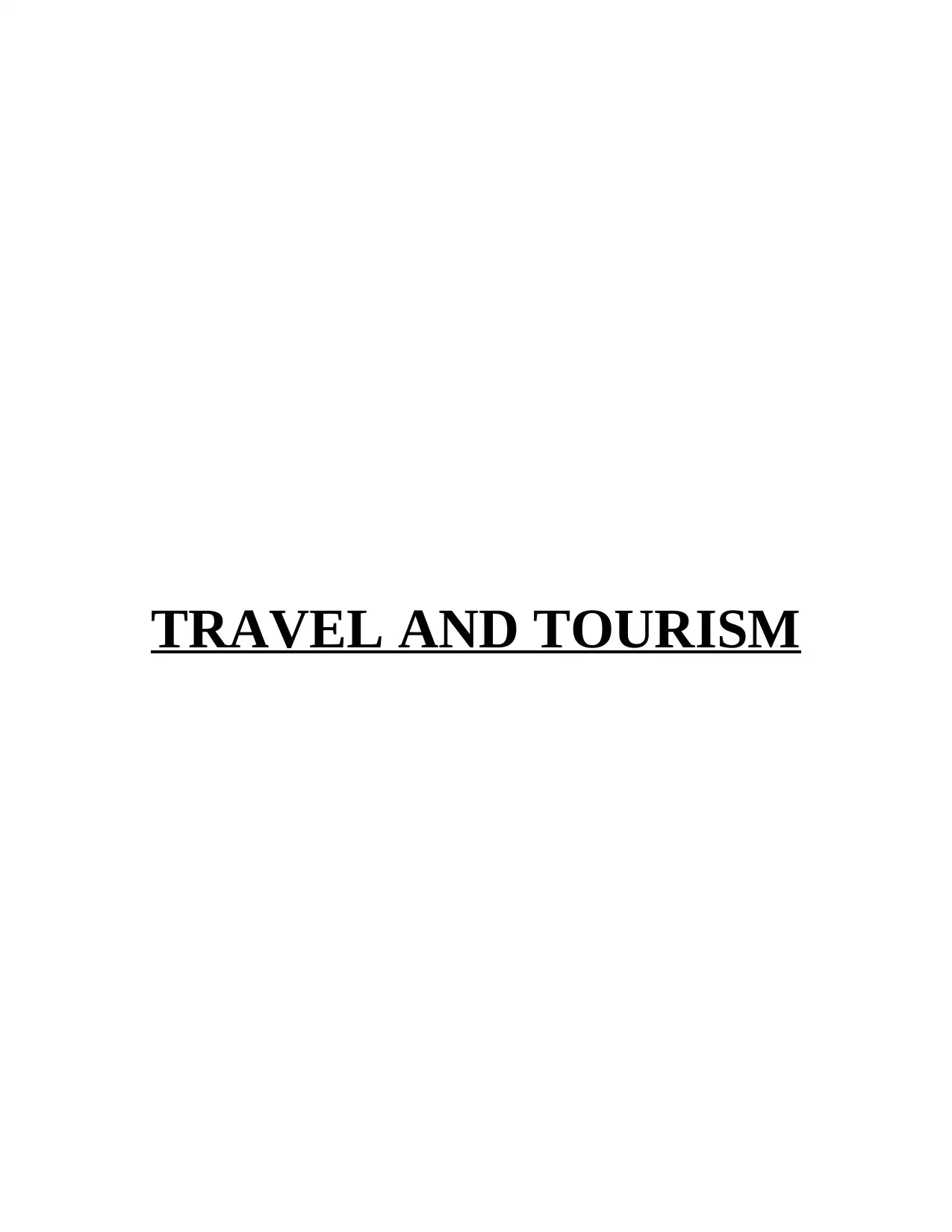
TRAVEL AND TOURISM
Paraphrase This Document
Need a fresh take? Get an instant paraphrase of this document with our AI Paraphraser
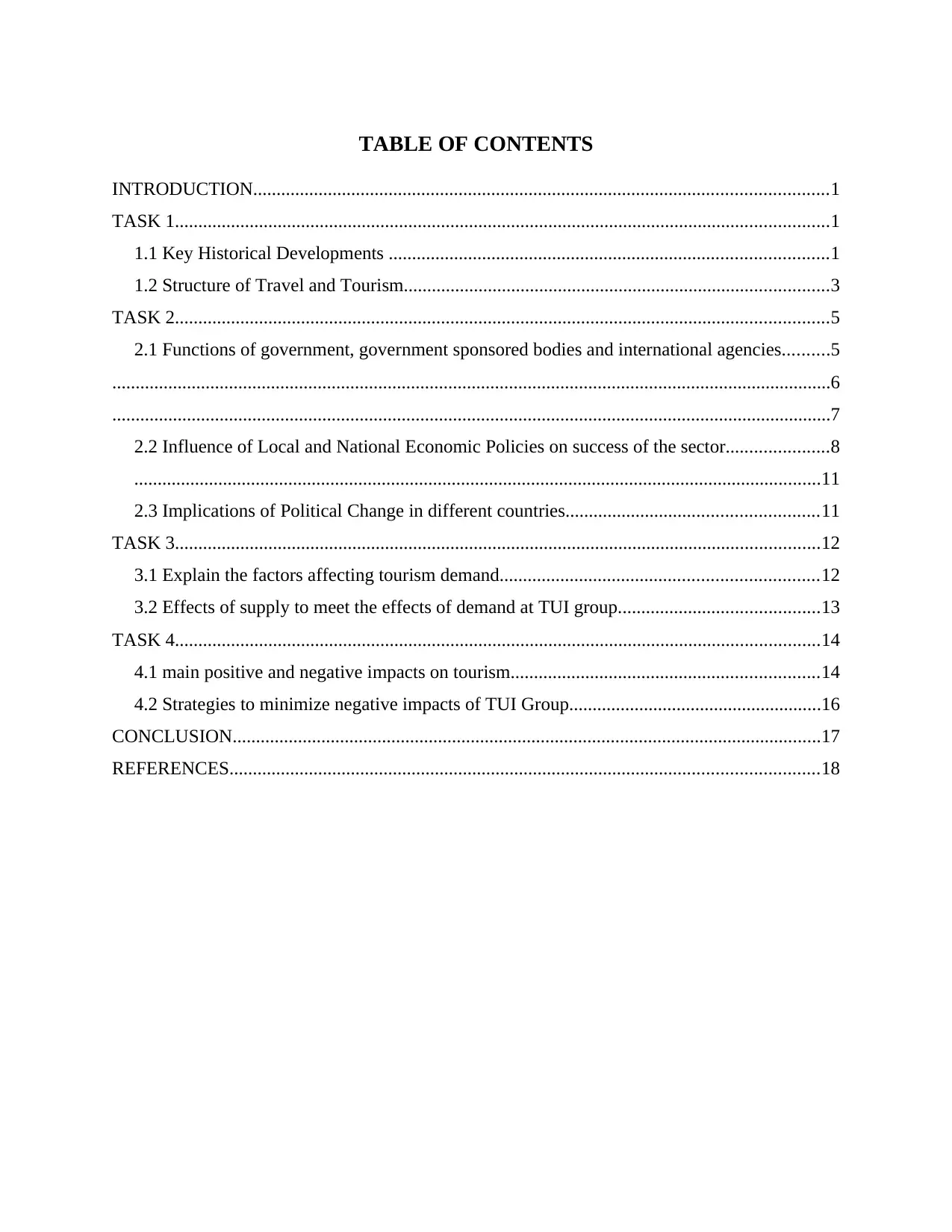
TABLE OF CONTENTS
INTRODUCTION...........................................................................................................................1
TASK 1............................................................................................................................................1
1.1 Key Historical Developments ..............................................................................................1
1.2 Structure of Travel and Tourism...........................................................................................3
TASK 2............................................................................................................................................5
2.1 Functions of government, government sponsored bodies and international agencies..........5
..........................................................................................................................................................6
..........................................................................................................................................................7
2.2 Influence of Local and National Economic Policies on success of the sector......................8
...................................................................................................................................................11
2.3 Implications of Political Change in different countries......................................................11
TASK 3..........................................................................................................................................12
3.1 Explain the factors affecting tourism demand....................................................................12
3.2 Effects of supply to meet the effects of demand at TUI group...........................................13
TASK 4..........................................................................................................................................14
4.1 main positive and negative impacts on tourism..................................................................14
4.2 Strategies to minimize negative impacts of TUI Group......................................................16
CONCLUSION..............................................................................................................................17
REFERENCES..............................................................................................................................18
INTRODUCTION...........................................................................................................................1
TASK 1............................................................................................................................................1
1.1 Key Historical Developments ..............................................................................................1
1.2 Structure of Travel and Tourism...........................................................................................3
TASK 2............................................................................................................................................5
2.1 Functions of government, government sponsored bodies and international agencies..........5
..........................................................................................................................................................6
..........................................................................................................................................................7
2.2 Influence of Local and National Economic Policies on success of the sector......................8
...................................................................................................................................................11
2.3 Implications of Political Change in different countries......................................................11
TASK 3..........................................................................................................................................12
3.1 Explain the factors affecting tourism demand....................................................................12
3.2 Effects of supply to meet the effects of demand at TUI group...........................................13
TASK 4..........................................................................................................................................14
4.1 main positive and negative impacts on tourism..................................................................14
4.2 Strategies to minimize negative impacts of TUI Group......................................................16
CONCLUSION..............................................................................................................................17
REFERENCES..............................................................................................................................18
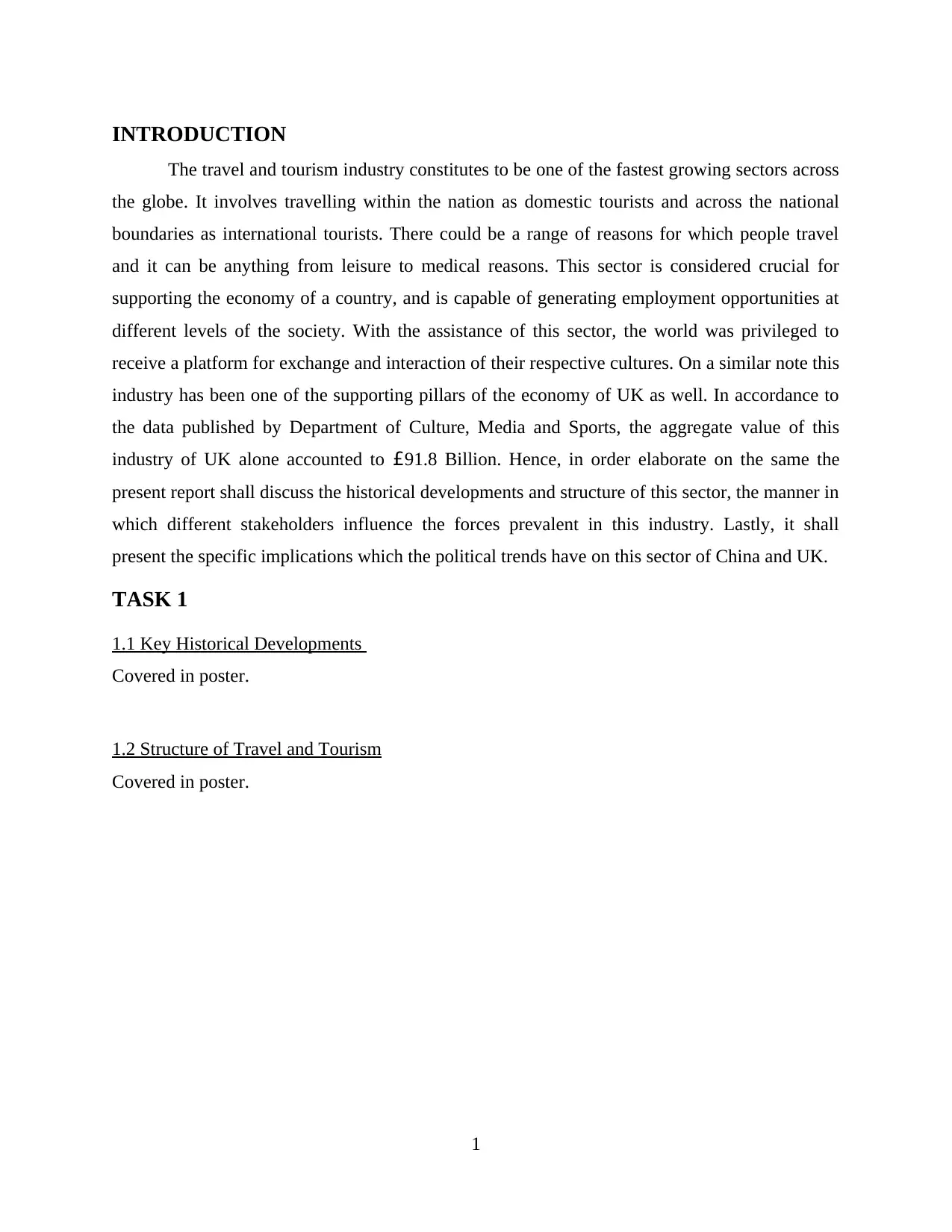
INTRODUCTION
The travel and tourism industry constitutes to be one of the fastest growing sectors across
the globe. It involves travelling within the nation as domestic tourists and across the national
boundaries as international tourists. There could be a range of reasons for which people travel
and it can be anything from leisure to medical reasons. This sector is considered crucial for
supporting the economy of a country, and is capable of generating employment opportunities at
different levels of the society. With the assistance of this sector, the world was privileged to
receive a platform for exchange and interaction of their respective cultures. On a similar note this
industry has been one of the supporting pillars of the economy of UK as well. In accordance to
the data published by Department of Culture, Media and Sports, the aggregate value of this
industry of UK alone accounted to £91.8 Billion. Hence, in order elaborate on the same the
present report shall discuss the historical developments and structure of this sector, the manner in
which different stakeholders influence the forces prevalent in this industry. Lastly, it shall
present the specific implications which the political trends have on this sector of China and UK.
TASK 1
1.1 Key Historical Developments
Covered in poster.
1.2 Structure of Travel and Tourism
Covered in poster.
1
The travel and tourism industry constitutes to be one of the fastest growing sectors across
the globe. It involves travelling within the nation as domestic tourists and across the national
boundaries as international tourists. There could be a range of reasons for which people travel
and it can be anything from leisure to medical reasons. This sector is considered crucial for
supporting the economy of a country, and is capable of generating employment opportunities at
different levels of the society. With the assistance of this sector, the world was privileged to
receive a platform for exchange and interaction of their respective cultures. On a similar note this
industry has been one of the supporting pillars of the economy of UK as well. In accordance to
the data published by Department of Culture, Media and Sports, the aggregate value of this
industry of UK alone accounted to £91.8 Billion. Hence, in order elaborate on the same the
present report shall discuss the historical developments and structure of this sector, the manner in
which different stakeholders influence the forces prevalent in this industry. Lastly, it shall
present the specific implications which the political trends have on this sector of China and UK.
TASK 1
1.1 Key Historical Developments
Covered in poster.
1.2 Structure of Travel and Tourism
Covered in poster.
1
⊘ This is a preview!⊘
Do you want full access?
Subscribe today to unlock all pages.

Trusted by 1+ million students worldwide
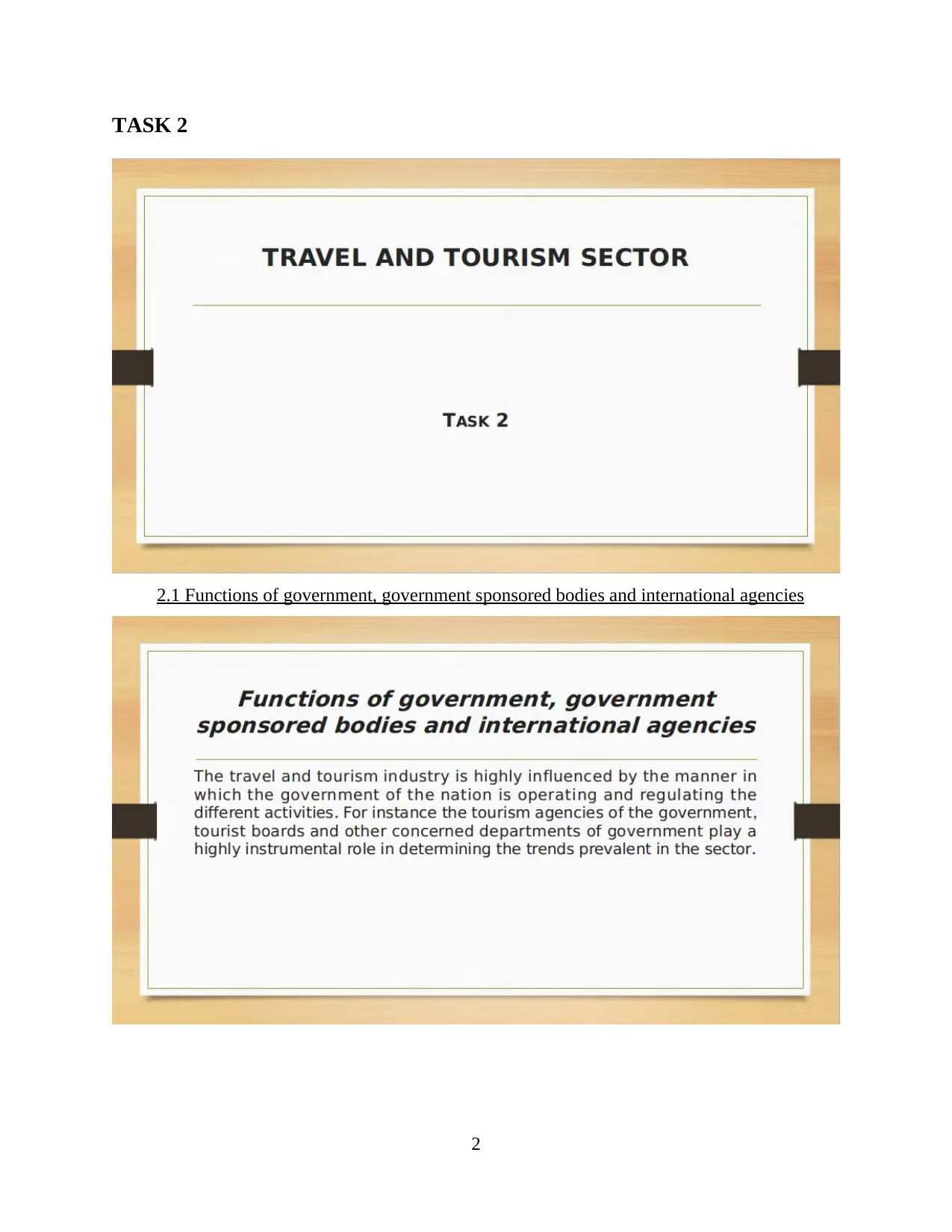
TASK 2
2.1 Functions of government, government sponsored bodies and international agencies
2
2.1 Functions of government, government sponsored bodies and international agencies
2
Paraphrase This Document
Need a fresh take? Get an instant paraphrase of this document with our AI Paraphraser
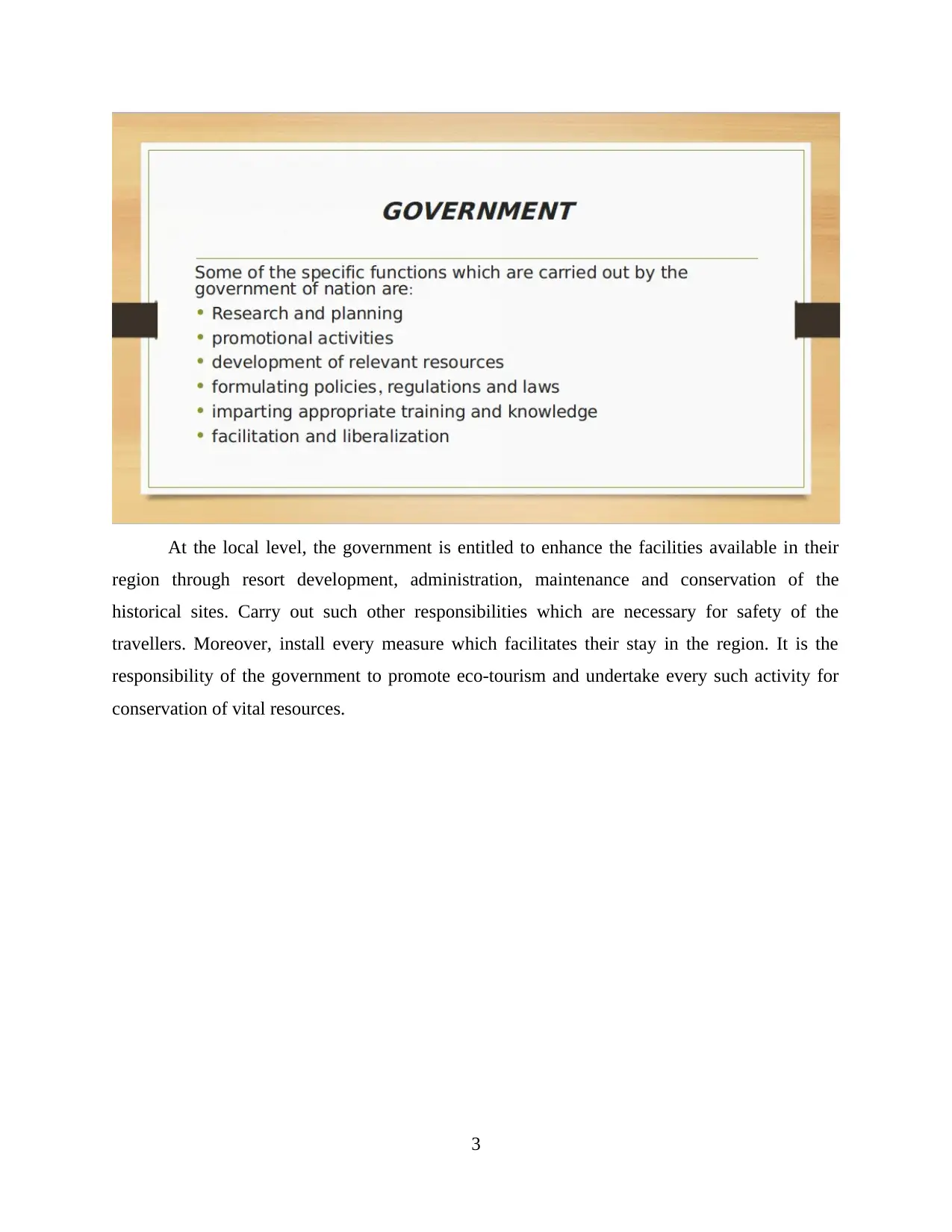
At the local level, the government is entitled to enhance the facilities available in their
region through resort development, administration, maintenance and conservation of the
historical sites. Carry out such other responsibilities which are necessary for safety of the
travellers. Moreover, install every measure which facilitates their stay in the region. It is the
responsibility of the government to promote eco-tourism and undertake every such activity for
conservation of vital resources.
3
region through resort development, administration, maintenance and conservation of the
historical sites. Carry out such other responsibilities which are necessary for safety of the
travellers. Moreover, install every measure which facilitates their stay in the region. It is the
responsibility of the government to promote eco-tourism and undertake every such activity for
conservation of vital resources.
3
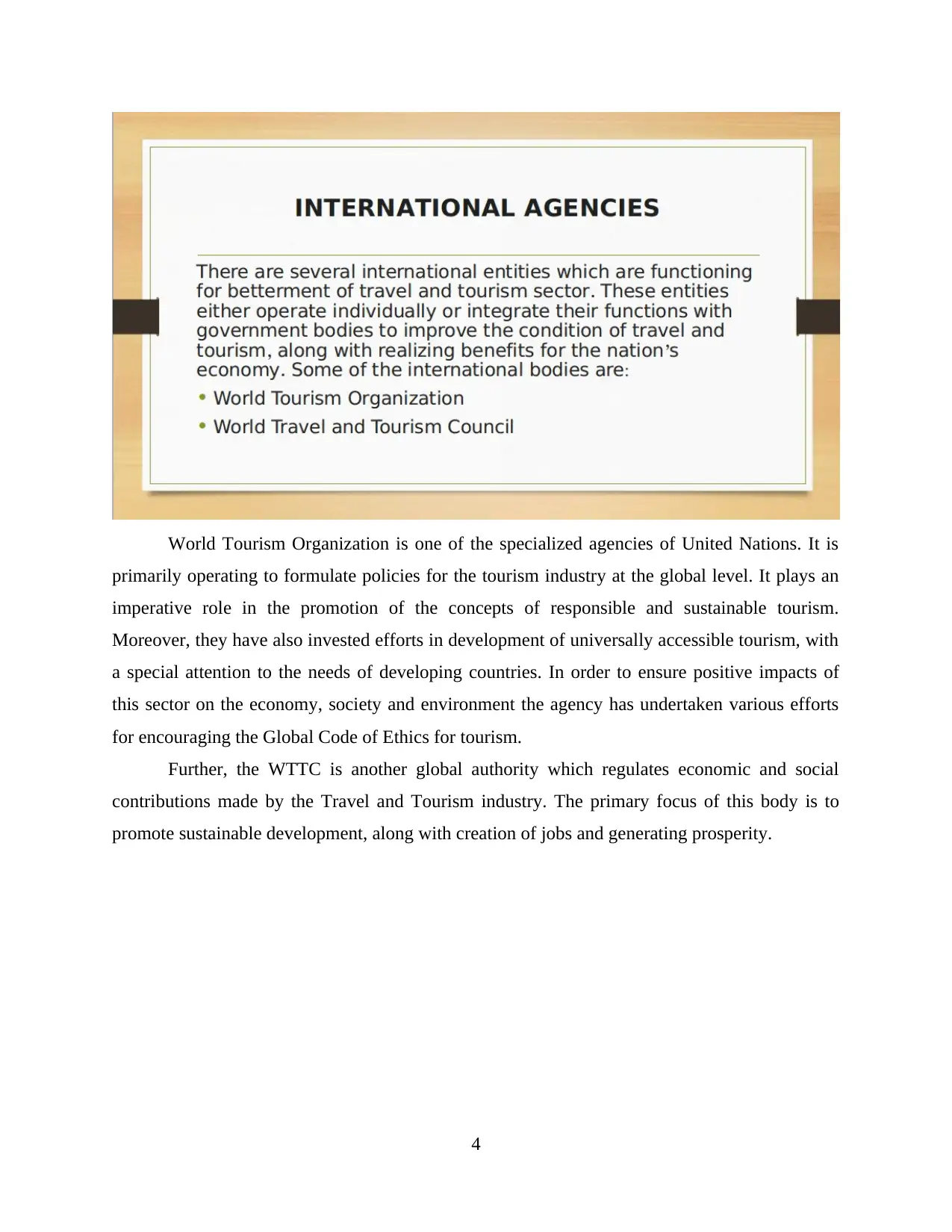
World Tourism Organization is one of the specialized agencies of United Nations. It is
primarily operating to formulate policies for the tourism industry at the global level. It plays an
imperative role in the promotion of the concepts of responsible and sustainable tourism.
Moreover, they have also invested efforts in development of universally accessible tourism, with
a special attention to the needs of developing countries. In order to ensure positive impacts of
this sector on the economy, society and environment the agency has undertaken various efforts
for encouraging the Global Code of Ethics for tourism.
Further, the WTTC is another global authority which regulates economic and social
contributions made by the Travel and Tourism industry. The primary focus of this body is to
promote sustainable development, along with creation of jobs and generating prosperity.
4
primarily operating to formulate policies for the tourism industry at the global level. It plays an
imperative role in the promotion of the concepts of responsible and sustainable tourism.
Moreover, they have also invested efforts in development of universally accessible tourism, with
a special attention to the needs of developing countries. In order to ensure positive impacts of
this sector on the economy, society and environment the agency has undertaken various efforts
for encouraging the Global Code of Ethics for tourism.
Further, the WTTC is another global authority which regulates economic and social
contributions made by the Travel and Tourism industry. The primary focus of this body is to
promote sustainable development, along with creation of jobs and generating prosperity.
4
⊘ This is a preview!⊘
Do you want full access?
Subscribe today to unlock all pages.

Trusted by 1+ million students worldwide
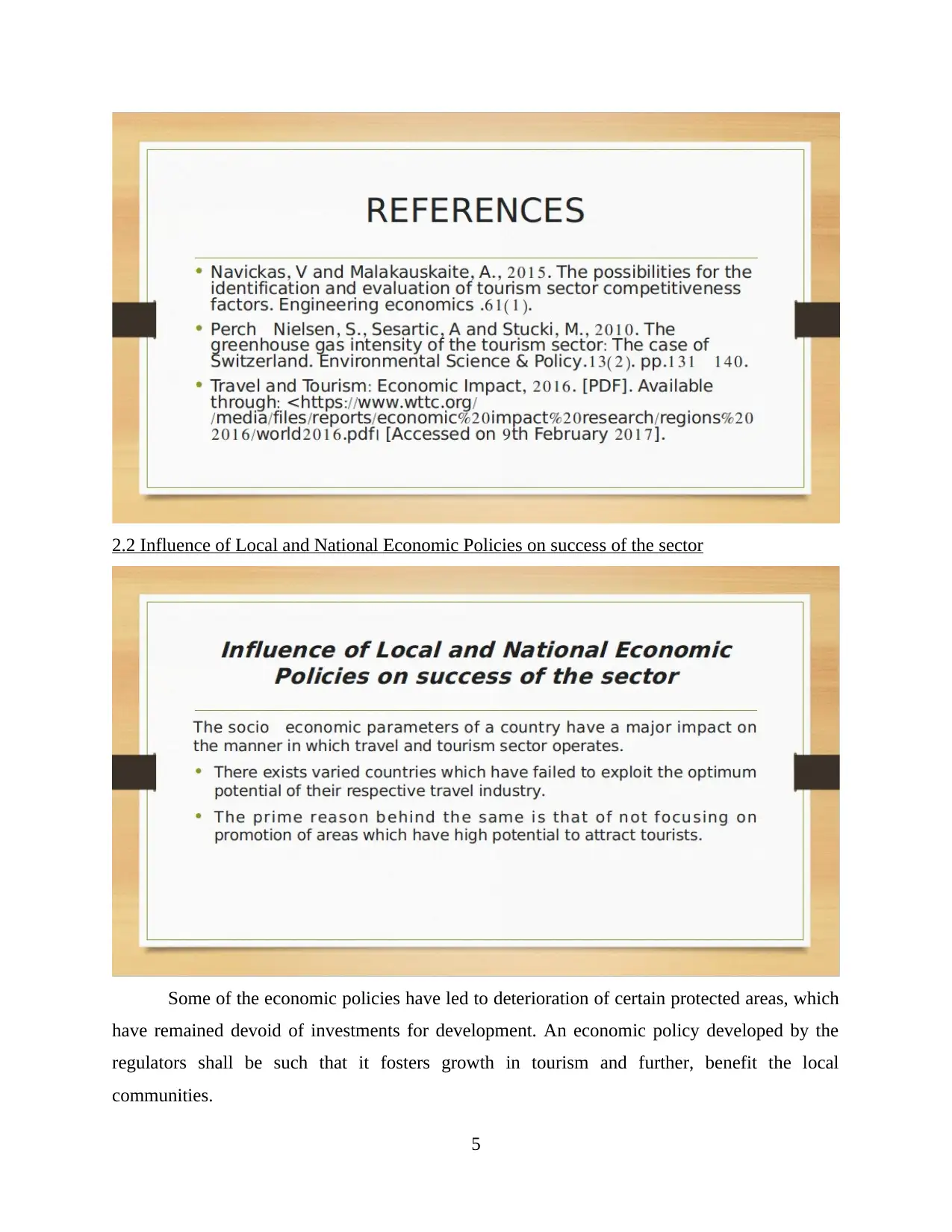
2.2 Influence of Local and National Economic Policies on success of the sector
Some of the economic policies have led to deterioration of certain protected areas, which
have remained devoid of investments for development. An economic policy developed by the
regulators shall be such that it fosters growth in tourism and further, benefit the local
communities.
5
Some of the economic policies have led to deterioration of certain protected areas, which
have remained devoid of investments for development. An economic policy developed by the
regulators shall be such that it fosters growth in tourism and further, benefit the local
communities.
5
Paraphrase This Document
Need a fresh take? Get an instant paraphrase of this document with our AI Paraphraser
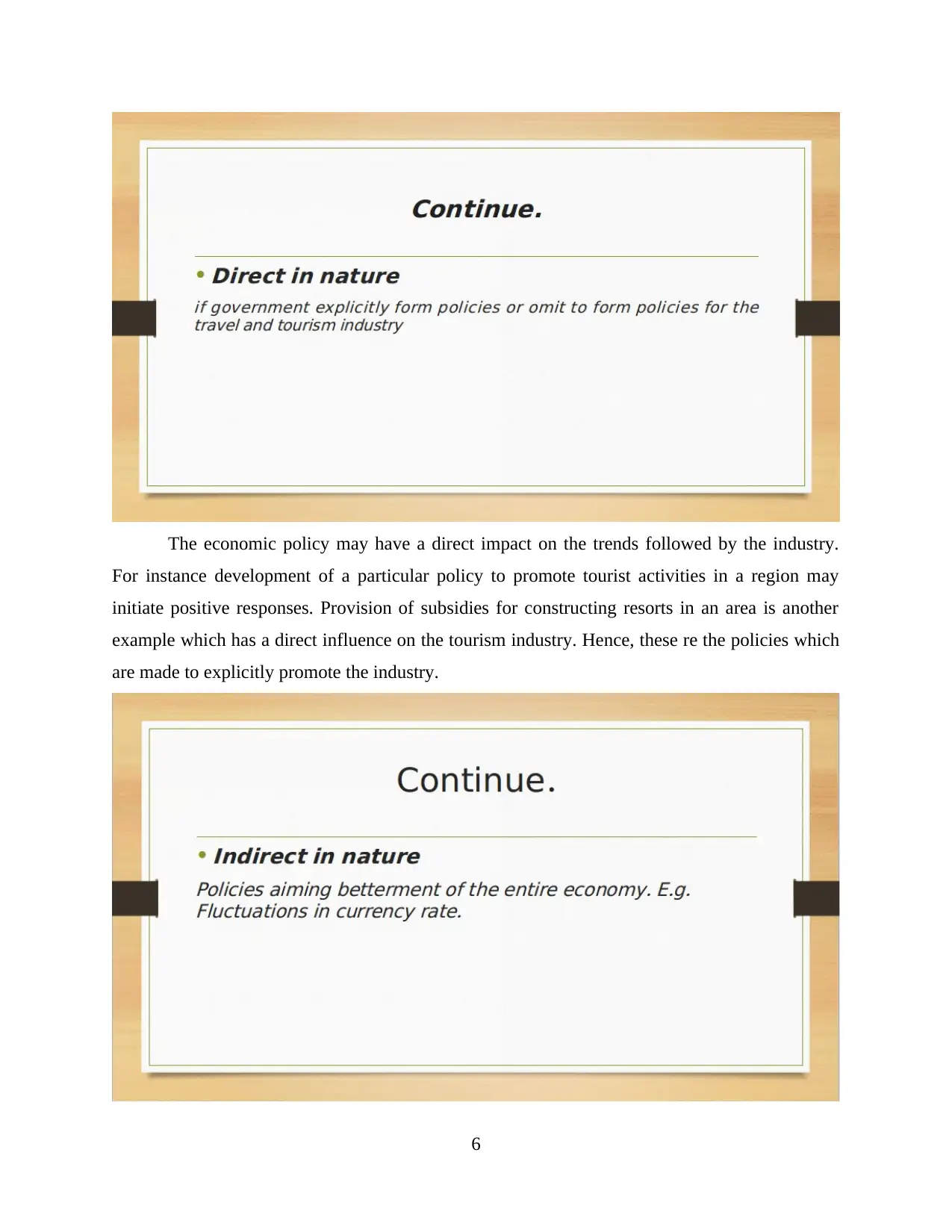
The economic policy may have a direct impact on the trends followed by the industry.
For instance development of a particular policy to promote tourist activities in a region may
initiate positive responses. Provision of subsidies for constructing resorts in an area is another
example which has a direct influence on the tourism industry. Hence, these re the policies which
are made to explicitly promote the industry.
6
For instance development of a particular policy to promote tourist activities in a region may
initiate positive responses. Provision of subsidies for constructing resorts in an area is another
example which has a direct influence on the tourism industry. Hence, these re the policies which
are made to explicitly promote the industry.
6
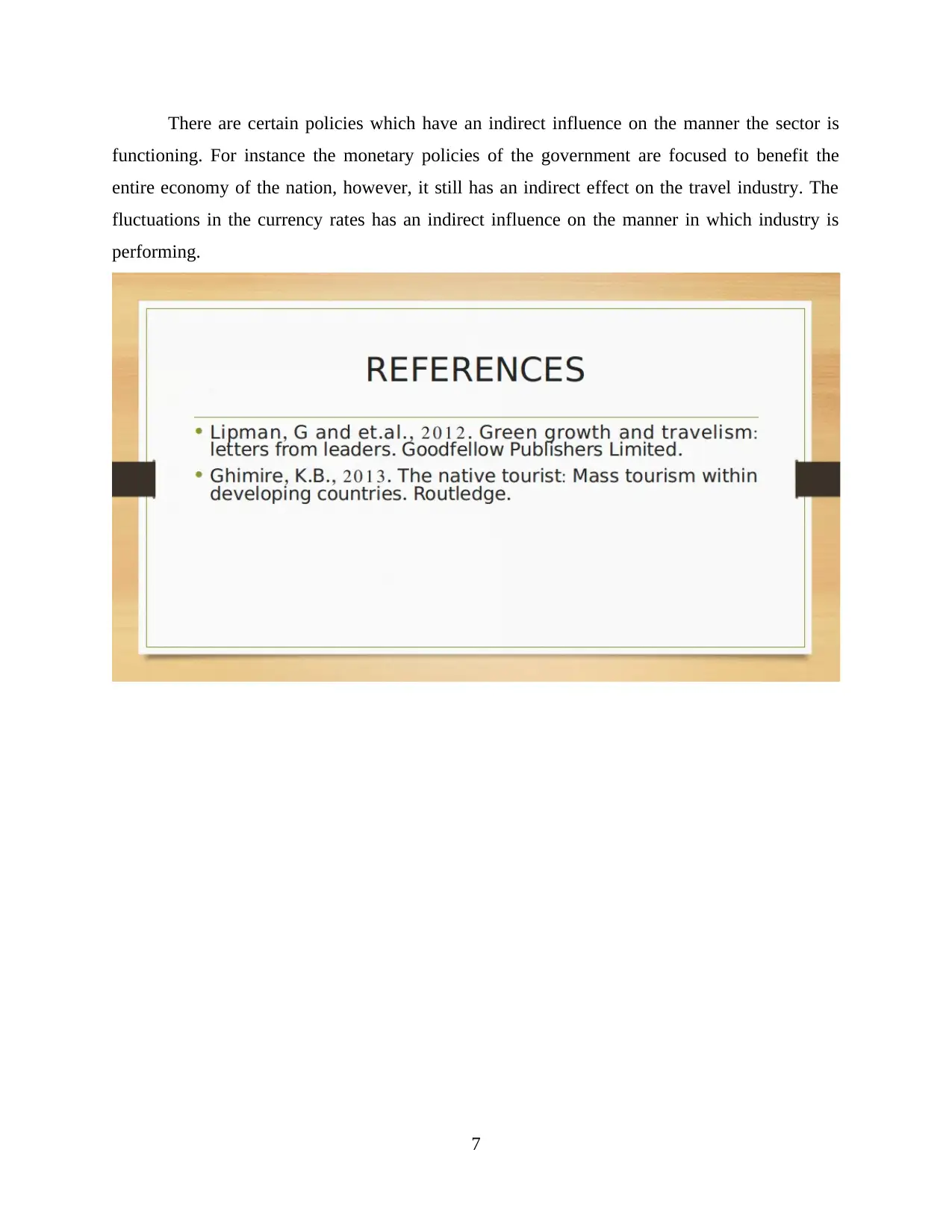
There are certain policies which have an indirect influence on the manner the sector is
functioning. For instance the monetary policies of the government are focused to benefit the
entire economy of the nation, however, it still has an indirect effect on the travel industry. The
fluctuations in the currency rates has an indirect influence on the manner in which industry is
performing.
7
functioning. For instance the monetary policies of the government are focused to benefit the
entire economy of the nation, however, it still has an indirect effect on the travel industry. The
fluctuations in the currency rates has an indirect influence on the manner in which industry is
performing.
7
⊘ This is a preview!⊘
Do you want full access?
Subscribe today to unlock all pages.

Trusted by 1+ million students worldwide
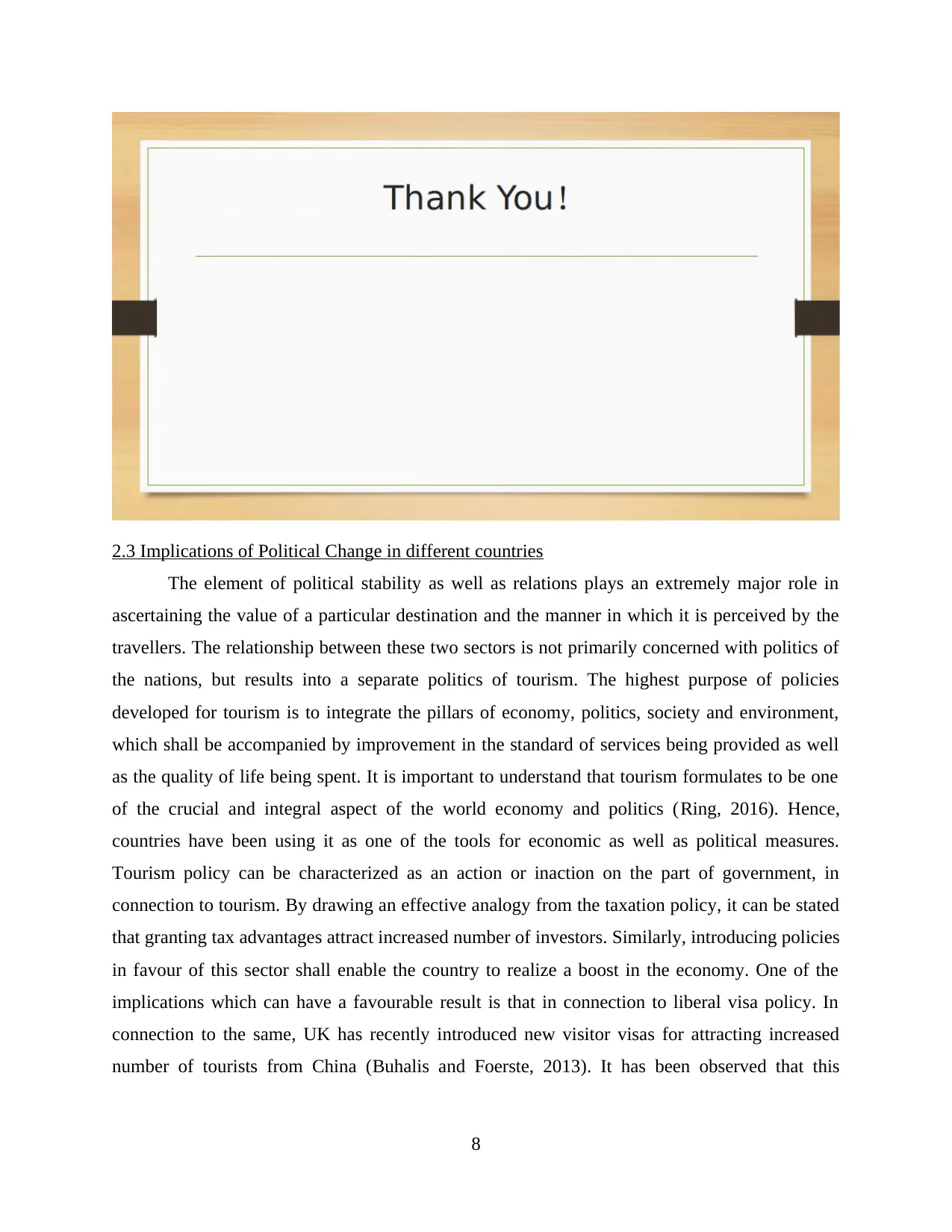
2.3 Implications of Political Change in different countries
The element of political stability as well as relations plays an extremely major role in
ascertaining the value of a particular destination and the manner in which it is perceived by the
travellers. The relationship between these two sectors is not primarily concerned with politics of
the nations, but results into a separate politics of tourism. The highest purpose of policies
developed for tourism is to integrate the pillars of economy, politics, society and environment,
which shall be accompanied by improvement in the standard of services being provided as well
as the quality of life being spent. It is important to understand that tourism formulates to be one
of the crucial and integral aspect of the world economy and politics (Ring, 2016). Hence,
countries have been using it as one of the tools for economic as well as political measures.
Tourism policy can be characterized as an action or inaction on the part of government, in
connection to tourism. By drawing an effective analogy from the taxation policy, it can be stated
that granting tax advantages attract increased number of investors. Similarly, introducing policies
in favour of this sector shall enable the country to realize a boost in the economy. One of the
implications which can have a favourable result is that in connection to liberal visa policy. In
connection to the same, UK has recently introduced new visitor visas for attracting increased
number of tourists from China (Buhalis and Foerste, 2013). It has been observed that this
8
The element of political stability as well as relations plays an extremely major role in
ascertaining the value of a particular destination and the manner in which it is perceived by the
travellers. The relationship between these two sectors is not primarily concerned with politics of
the nations, but results into a separate politics of tourism. The highest purpose of policies
developed for tourism is to integrate the pillars of economy, politics, society and environment,
which shall be accompanied by improvement in the standard of services being provided as well
as the quality of life being spent. It is important to understand that tourism formulates to be one
of the crucial and integral aspect of the world economy and politics (Ring, 2016). Hence,
countries have been using it as one of the tools for economic as well as political measures.
Tourism policy can be characterized as an action or inaction on the part of government, in
connection to tourism. By drawing an effective analogy from the taxation policy, it can be stated
that granting tax advantages attract increased number of investors. Similarly, introducing policies
in favour of this sector shall enable the country to realize a boost in the economy. One of the
implications which can have a favourable result is that in connection to liberal visa policy. In
connection to the same, UK has recently introduced new visitor visas for attracting increased
number of tourists from China (Buhalis and Foerste, 2013). It has been observed that this
8
Paraphrase This Document
Need a fresh take? Get an instant paraphrase of this document with our AI Paraphraser
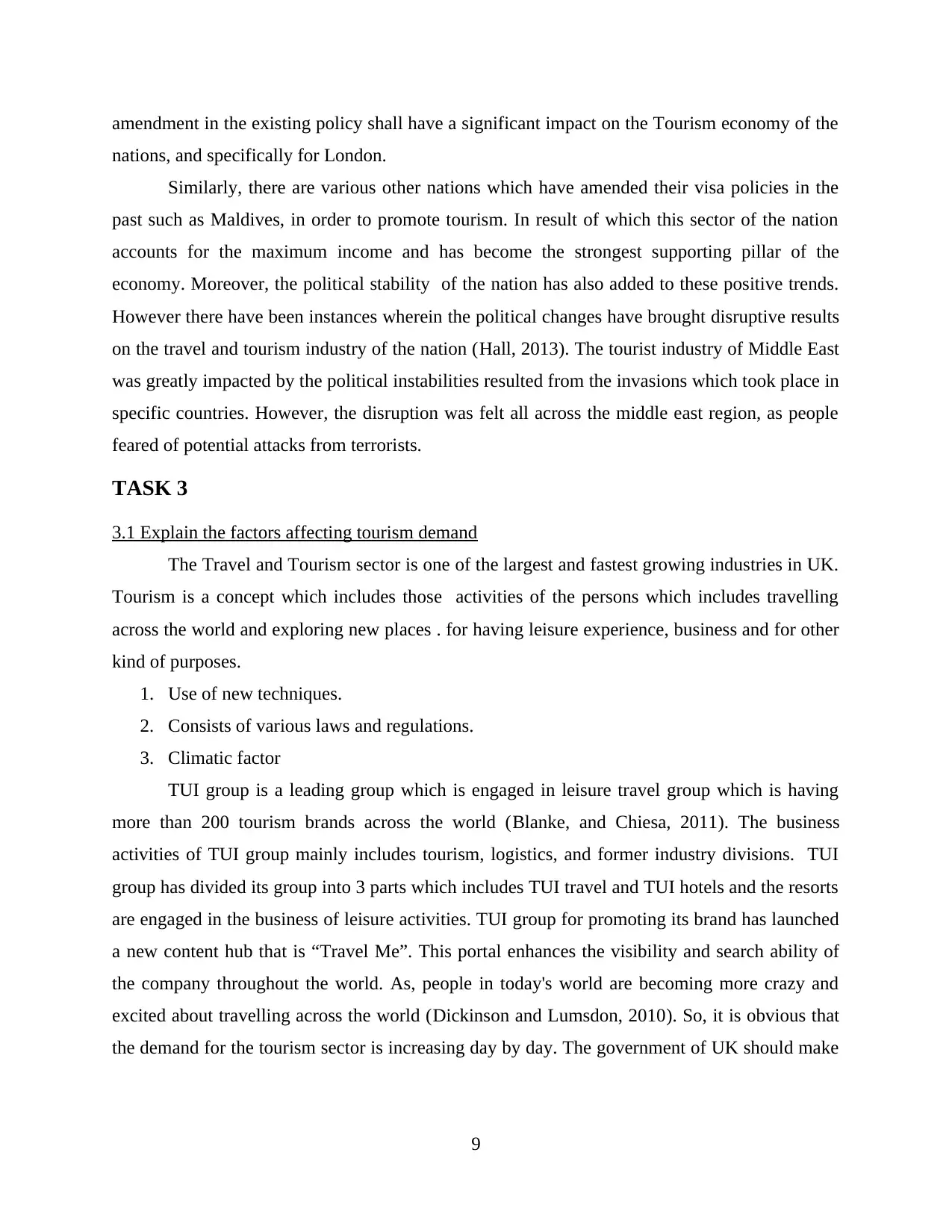
amendment in the existing policy shall have a significant impact on the Tourism economy of the
nations, and specifically for London.
Similarly, there are various other nations which have amended their visa policies in the
past such as Maldives, in order to promote tourism. In result of which this sector of the nation
accounts for the maximum income and has become the strongest supporting pillar of the
economy. Moreover, the political stability of the nation has also added to these positive trends.
However there have been instances wherein the political changes have brought disruptive results
on the travel and tourism industry of the nation (Hall, 2013). The tourist industry of Middle East
was greatly impacted by the political instabilities resulted from the invasions which took place in
specific countries. However, the disruption was felt all across the middle east region, as people
feared of potential attacks from terrorists.
TASK 3
3.1 Explain the factors affecting tourism demand
The Travel and Tourism sector is one of the largest and fastest growing industries in UK.
Tourism is a concept which includes those activities of the persons which includes travelling
across the world and exploring new places . for having leisure experience, business and for other
kind of purposes.
1. Use of new techniques.
2. Consists of various laws and regulations.
3. Climatic factor
TUI group is a leading group which is engaged in leisure travel group which is having
more than 200 tourism brands across the world (Blanke, and Chiesa, 2011). The business
activities of TUI group mainly includes tourism, logistics, and former industry divisions. TUI
group has divided its group into 3 parts which includes TUI travel and TUI hotels and the resorts
are engaged in the business of leisure activities. TUI group for promoting its brand has launched
a new content hub that is “Travel Me”. This portal enhances the visibility and search ability of
the company throughout the world. As, people in today's world are becoming more crazy and
excited about travelling across the world (Dickinson and Lumsdon, 2010). So, it is obvious that
the demand for the tourism sector is increasing day by day. The government of UK should make
9
nations, and specifically for London.
Similarly, there are various other nations which have amended their visa policies in the
past such as Maldives, in order to promote tourism. In result of which this sector of the nation
accounts for the maximum income and has become the strongest supporting pillar of the
economy. Moreover, the political stability of the nation has also added to these positive trends.
However there have been instances wherein the political changes have brought disruptive results
on the travel and tourism industry of the nation (Hall, 2013). The tourist industry of Middle East
was greatly impacted by the political instabilities resulted from the invasions which took place in
specific countries. However, the disruption was felt all across the middle east region, as people
feared of potential attacks from terrorists.
TASK 3
3.1 Explain the factors affecting tourism demand
The Travel and Tourism sector is one of the largest and fastest growing industries in UK.
Tourism is a concept which includes those activities of the persons which includes travelling
across the world and exploring new places . for having leisure experience, business and for other
kind of purposes.
1. Use of new techniques.
2. Consists of various laws and regulations.
3. Climatic factor
TUI group is a leading group which is engaged in leisure travel group which is having
more than 200 tourism brands across the world (Blanke, and Chiesa, 2011). The business
activities of TUI group mainly includes tourism, logistics, and former industry divisions. TUI
group has divided its group into 3 parts which includes TUI travel and TUI hotels and the resorts
are engaged in the business of leisure activities. TUI group for promoting its brand has launched
a new content hub that is “Travel Me”. This portal enhances the visibility and search ability of
the company throughout the world. As, people in today's world are becoming more crazy and
excited about travelling across the world (Dickinson and Lumsdon, 2010). So, it is obvious that
the demand for the tourism sector is increasing day by day. The government of UK should make
9
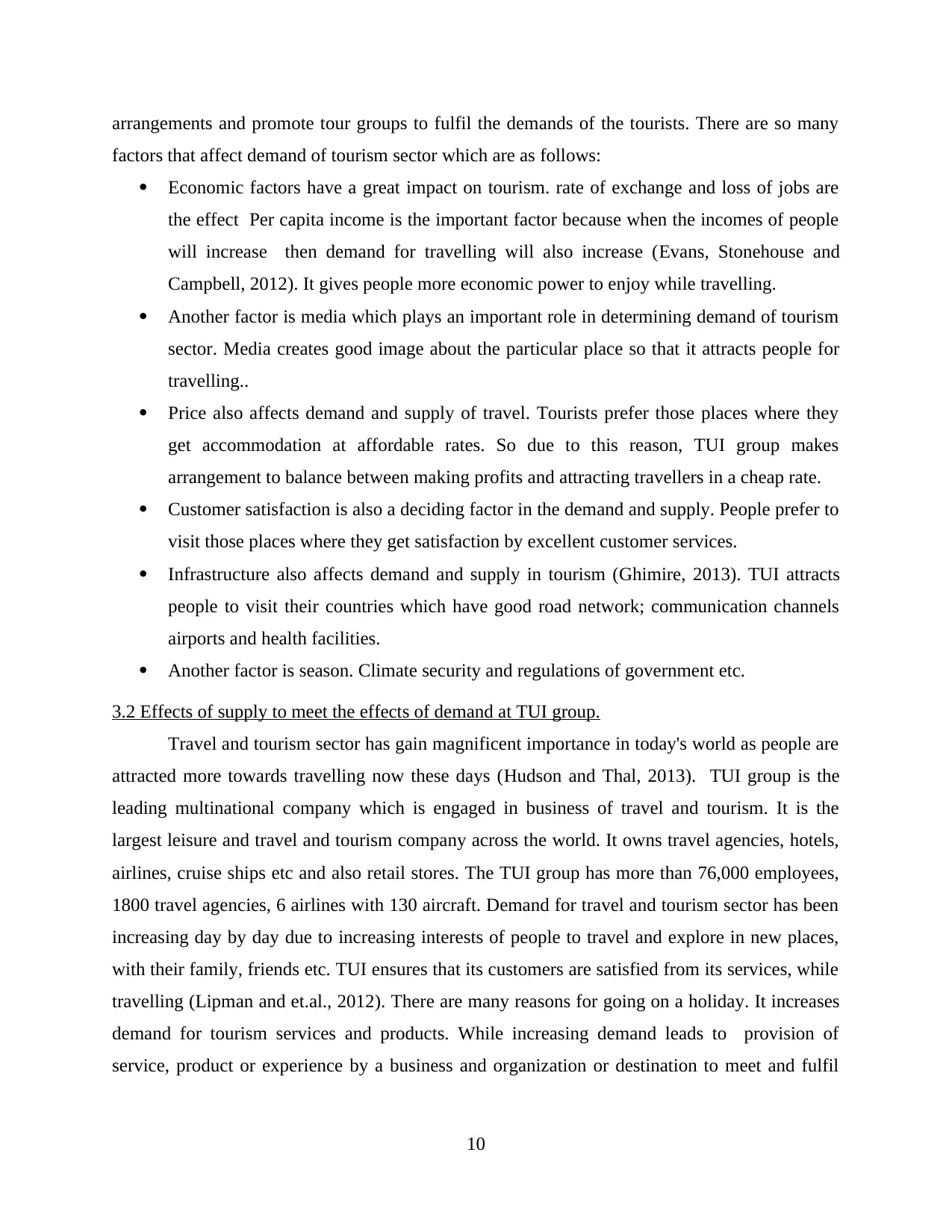
arrangements and promote tour groups to fulfil the demands of the tourists. There are so many
factors that affect demand of tourism sector which are as follows:
Economic factors have a great impact on tourism. rate of exchange and loss of jobs are
the effect Per capita income is the important factor because when the incomes of people
will increase then demand for travelling will also increase (Evans, Stonehouse and
Campbell, 2012). It gives people more economic power to enjoy while travelling.
Another factor is media which plays an important role in determining demand of tourism
sector. Media creates good image about the particular place so that it attracts people for
travelling..
Price also affects demand and supply of travel. Tourists prefer those places where they
get accommodation at affordable rates. So due to this reason, TUI group makes
arrangement to balance between making profits and attracting travellers in a cheap rate.
Customer satisfaction is also a deciding factor in the demand and supply. People prefer to
visit those places where they get satisfaction by excellent customer services.
Infrastructure also affects demand and supply in tourism (Ghimire, 2013). TUI attracts
people to visit their countries which have good road network; communication channels
airports and health facilities.
Another factor is season. Climate security and regulations of government etc.
3.2 Effects of supply to meet the effects of demand at TUI group.
Travel and tourism sector has gain magnificent importance in today's world as people are
attracted more towards travelling now these days (Hudson and Thal, 2013). TUI group is the
leading multinational company which is engaged in business of travel and tourism. It is the
largest leisure and travel and tourism company across the world. It owns travel agencies, hotels,
airlines, cruise ships etc and also retail stores. The TUI group has more than 76,000 employees,
1800 travel agencies, 6 airlines with 130 aircraft. Demand for travel and tourism sector has been
increasing day by day due to increasing interests of people to travel and explore in new places,
with their family, friends etc. TUI ensures that its customers are satisfied from its services, while
travelling (Lipman and et.al., 2012). There are many reasons for going on a holiday. It increases
demand for tourism services and products. While increasing demand leads to provision of
service, product or experience by a business and organization or destination to meet and fulfil
10
factors that affect demand of tourism sector which are as follows:
Economic factors have a great impact on tourism. rate of exchange and loss of jobs are
the effect Per capita income is the important factor because when the incomes of people
will increase then demand for travelling will also increase (Evans, Stonehouse and
Campbell, 2012). It gives people more economic power to enjoy while travelling.
Another factor is media which plays an important role in determining demand of tourism
sector. Media creates good image about the particular place so that it attracts people for
travelling..
Price also affects demand and supply of travel. Tourists prefer those places where they
get accommodation at affordable rates. So due to this reason, TUI group makes
arrangement to balance between making profits and attracting travellers in a cheap rate.
Customer satisfaction is also a deciding factor in the demand and supply. People prefer to
visit those places where they get satisfaction by excellent customer services.
Infrastructure also affects demand and supply in tourism (Ghimire, 2013). TUI attracts
people to visit their countries which have good road network; communication channels
airports and health facilities.
Another factor is season. Climate security and regulations of government etc.
3.2 Effects of supply to meet the effects of demand at TUI group.
Travel and tourism sector has gain magnificent importance in today's world as people are
attracted more towards travelling now these days (Hudson and Thal, 2013). TUI group is the
leading multinational company which is engaged in business of travel and tourism. It is the
largest leisure and travel and tourism company across the world. It owns travel agencies, hotels,
airlines, cruise ships etc and also retail stores. The TUI group has more than 76,000 employees,
1800 travel agencies, 6 airlines with 130 aircraft. Demand for travel and tourism sector has been
increasing day by day due to increasing interests of people to travel and explore in new places,
with their family, friends etc. TUI ensures that its customers are satisfied from its services, while
travelling (Lipman and et.al., 2012). There are many reasons for going on a holiday. It increases
demand for tourism services and products. While increasing demand leads to provision of
service, product or experience by a business and organization or destination to meet and fulfil
10
⊘ This is a preview!⊘
Do you want full access?
Subscribe today to unlock all pages.

Trusted by 1+ million students worldwide
1 out of 18
Related Documents
Your All-in-One AI-Powered Toolkit for Academic Success.
+13062052269
info@desklib.com
Available 24*7 on WhatsApp / Email
![[object Object]](/_next/static/media/star-bottom.7253800d.svg)
Unlock your academic potential
Copyright © 2020–2026 A2Z Services. All Rights Reserved. Developed and managed by ZUCOL.





